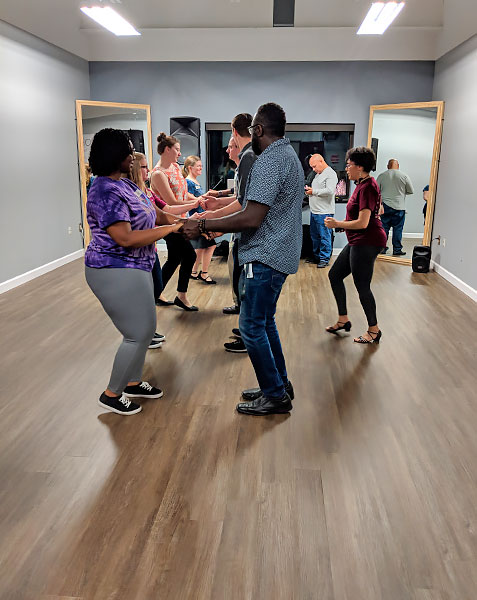



People go to dance lessons or socials at the Aroha Arts Collective seeking liberation and community, says owner and instructor Adalia Ellis.
“The majority will say, ‘This time is for me,’” she says. “This time is for me to get to relief, relax, be creative, be social.”
Some also turn to the Florence, South Carolina, studio in a time of loss such as divorce or the death of a family member.
And for some African Americans, the experience helps cement identity.
“One of my dance students said it best,” Ellis recounts. “She was like, ‘For those of us who have felt such a longing for connection to our African roots, coming in and doing dances is a way to find a connection to that reality.’”

Ellis says for South Carolinians the feeling is acute. Charleston was a principal point of entry for people who were taken from Africa and transported either directly to the United States or via the Caribbean.
“So there’s a lot of healing that can happen” from hearing more of the story, she says. “We actually had a history before our ancestors were brought here as slaves.”
The dances Ellis teaches are African — kizomba, for example — or rooted in Africa and infused with Latin influences — think salsa, bachata, cha-cha and merengue.
“Some of the movement actually can be connected directly to the physical bondage that the slaves were in,” she explains. “The bachata and merengue are related to the restriction of movement because of the shackles on the feet.
“When you see them now you don’t see the connection because the merengue is a happy, very upbeat style of dance. The bachata is like ‘Oh, she broke my heart,’” she says, chuckling.
Regardless, they’re “beautiful dances of defiance and survival. They’re very rooted in Africa.”
They’re also bringing people of all cultures together. Ellis, a Baha’i in Florence, has always hoped for that and can bring it to fruition now that her studio has opened in the Gould Business Incubator.
“I had wanted my own space for a long time and everywhere I looked was so expensive,” says Ellis. “It’s been a long journey, so when I say this I’m saying it very deeply that [the incubator] was a godsend.” Not only is it affordable, but the incubator aims to “help businesses succeed” through advice and services for entrepreneurs.
The tools provided by Gould and the Baha’i writings on rectitude of conduct also have helped Ellis navigate situations in which some “people don’t do business with the intent to be authentic and truthful and supportive.”
The central Baha’i principle of the oneness of humanity also is guiding the development of Aroha as a means for people of all backgrounds to find unity in diversity and has led to some meaningful conversations about the teachings of Baha’u’llah, Prophet-Founder of the Baha’i Faith.
That’s been true from day one, a grand opening that “was for me way more than I expected,” she recalls. “It was a magical spiritual experience and it was one that people left feeling that it was the most special thing they’d been to in a while.
“And, honestly, that magical spiritual experience was connected to the community that is being built and created through Aroha Arts Collective — through the dance classes, through the events that that we have, through the students that come.”
As Ellis describes the scene, “Everyone was so warm and friendly and everyone danced with everyone and talked. I had a whole other space, the reception area, with tables and food, and people all sat down together and got to know each other over food.
“That obviously carried over into the studio, where they were dancing together and watching other people dance and just really enjoying being in this space where this family community energy was so palpable.”
Aroha Arts Collective continues to hold socials at the studio and at Soulé — a café that is considered “the spot to be if you want to meet people and hang out” and is owned by an African American musician who was “the first one that gave me a chance here in Florence.”
Sunday afternoon socials she holds at Soulé are family-oriented, says Ellis. “Children are always welcomed with open arms and everyone dances with them.”
Then there’s the Afro Latin Soirée, which is a bit more formal — dress is typically African-inspired or “black and bling” — and, with a 10 p.m. starting time, is aimed at adults.
“At some point, these people all intersect” at Aroha’s studio, she says. “We all end up dancing together.”
But as fulfilling, and perhaps exhausting, as that busy schedule is for Ellis, she’s carving out time for two other important initiatives.
She recently was given approval to lead a course on the history of Afro Latin dance at Francis Marion University, where she teaches public speaking part time.
And she is putting together a weekend workshop called the Convergence Symposium for people who are “truly interested in the intersection of the arts and social action and how it can unite communities, how it can educate communities, how with can provide momentum to communities.”
The symposium will honor the life of Muhiyidin El Amin Moye (known widely as Moya Moye or Muhiyidin D’baha), a Baha’i and Black Lives Matter activist from South Carolina who was slain in New Orleans on Feb. 6, 2018. Ellis says participants will be “really calling him into this space and really wanting his spiritual energy in the space the entire weekend.”
Just as spiritual energy imbues all the endeavors of Aroha Arts Collective.◼


![]()
![]()
Whether you are exploring the Bahá'í Faith or looking to become an active member, there are various ways you can connect with our community.
Please ensure that all the Required Fields* are completed before submitting.